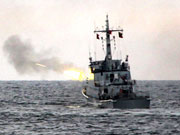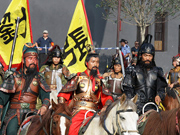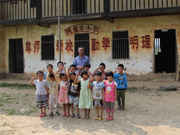BEIJING, Sept. 18 -- The siren that howls over northeast China's Shenyang city each year on Sept. 18 is a solemn reminder of a shameful time decades ago, when the country backed down in the face of invasion.
It is important for China to remember the day as a bitter lesson learned through blood, pain and death.
On this day in 1931, Japan unfurled a plot to take over China, starting from three provinces in the northeast, Heilongjiang, Jilin and Liaoning.
In their initial march, the Japanese army did not come across any form of organized resistance. The Kuomintang government decided not to fight and the government army in the three provinces retreated to the south after Sept. 18. It took Japan only a few months to fully seize the northeast and set up the puppet state named "Manchukuo".
The 30 million Chinese in the northeast who suffered the brunt of the initial invasion were the first of many. Despite the Chinese government's compromise on its land and sovereignty, peace was temporary. Six years later Japan initiated a full-scale invasion into China.
The eight-year war which followed, ending with Japan's surrender in 1945, cost more than 36 million Chinese lives and badly scarred the land.
From this part of history, China learns that invaders cannot be bought, only beaten and peace cannot be traded, only protected.
The 83rd anniversary of the 9.18 Incident was given a special commemoration this year, as senior Communist Party of China official Liu Yunshan joined citizens in Shenyang to strike a large memorial bell with the words "never forget national humiliation" carved into the side.
It is the latest of high-profile occasions dedicated to remembering the anti-Japanese aggression war.
This year China's top legislature made Sept. 3 an official observance day for victory in the anti-fascist war. President Xi Jinping attended a ceremony to mark the day and addressed a symposium calling on the Japanese government to admit to and reflect on its history of militarist aggression.
The State Archives Administration (SAA) published 45 written confessions by convicted Japanese war criminals during the World War II.
From Wednesday, China began publishing oral testimonies of 100 survivors of the 1937 Nanjing Massacre.
This is not a sudden surge of nationalism but a righteous reaction to the blind denial of Japan's WWII crime from Japan's right-winged politicians and the government they now dominate.
The Japanese government not only refuses to show remorse of the past but also tried reviving the ghost of the country's militaristic past. For instance, in July Japan's cabinet endorsed a reinterpretation of the pacifist Constitution for the right of collective self-defense, which paves the way for sending soldiers into battle overseas to defend Japan and "countries with close ties".
The incident on Sept. 18 1931 taught China a lesson that aggressors often come in disguise, at first asking a small price, they will not be satisfied until their stomachs are full.
 |

 Female Top Guns have display dates
Female Top Guns have display dates Leading director Wang Quan'an detained for 'buying sex'
Leading director Wang Quan'an detained for 'buying sex' PLA navy conducts live fire drill in East China Sea
PLA navy conducts live fire drill in East China Sea Top 10 Chinese actresses with pretty face
Top 10 Chinese actresses with pretty face Say cheese, kittens and puppies!
Say cheese, kittens and puppies! Top 10 Chinese goddesses selected by S. Korean media
Top 10 Chinese goddesses selected by S. Korean media Going back to Three Kingdoms Period in Zhaohua ancient city
Going back to Three Kingdoms Period in Zhaohua ancient city Most amazing chi-pao beauties
Most amazing chi-pao beauties Xisha Islands welcomes first visitors
Xisha Islands welcomes first visitors Special thanks to special teachers
Special thanks to special teachers
Day|Week|Month